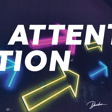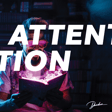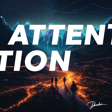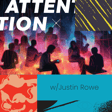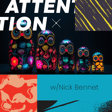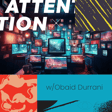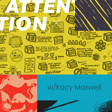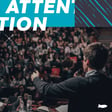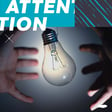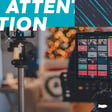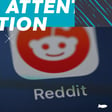Become a Creator today!Start creating today - Share your story with the world!
Start for free
00:00:00
00:00:01

The Power of Narrative Podcasts: How Stories Drive Brand Favorability
Today we have a special interview with Annalise Nielsen. In this episode, we dive deep into the topic of narrative podcasts and how they can drive brand favorability. Annalise shares valuable insights, backed by data collected by Signal Hill Insights, on why narrative podcasts outperform conversational podcasts in building affinity with listeners. So let's not waste any more time and jump right into it!
Transcript
Introduction to the Attention Podcast
00:00:03
Speaker
Welcome back to the Attention Podcast where you'll learn how to gain and retain the attention of your buyers to build an audience.
Premium Podcasts in a Saturated Market
00:00:08
Speaker
I'm Dan Sanchez and today I talk to Annalise Nielsen about premium podcast content or narrative podcast content.
The Rise and Benefits of Premium Podcasts
00:00:16
Speaker
Because in a day when there are more and more podcasts to listen to, premium is starting to rise above the fold in order to build affinity with more prospects and create an unfair advantage with the buyers.
Effectiveness of Narrative Podcasts
00:00:30
Speaker
So I wanted to talk to Annalise, who's the head of strategy and development at Pacific Content, which is like the best, biggest premium podcast agency out there about why it's working in an article she wrote and posted on LinkedIn a month ago, talking about the lift they're seeing in narrative shows. So I'm excited to share this with you. Let's dive into it.
00:00:55
Speaker
I love the article that you wrote on LinkedIn talking about stories driving affinity on, you posted it to LinkedIn, but I think it was on Medium. So Annalise, could you give me some background in like, how did this article become a reality and tell the audience a little bit about what you wrote here? And then we'll, we'll pick it apart and
Data Insights on Narrative Podcasts
00:01:15
Speaker
dive into it.
00:01:15
Speaker
I wrote a blog post about how narrative podcasts drive brand favourability better than conversational podcasts, essentially. Compared to chat style shows, interview style shows, conversational podcasts, narrative podcasts have driven more brand favourability, 10 percentage points higher in brand favourability.
00:01:37
Speaker
That's data that was collected by Signal Hill Insights. Signal Hill Insights reached out to us actually and wanted to share that they had been collecting some data, looking at some data, just a cross-section across all of the brand-lift studies that they've conducted in the past to dig in a little bit deeper now that they have this.
00:01:55
Speaker
meta analysis of all of these different brand lift studies that they've conducted. And that was one of the findings that they found after digging into sort of an analysis across the board of all of these different brand lift studies.
Motivation for Writing on Narrative Podcasts
00:02:08
Speaker
And they wanted to share that with us. They thought that would be interesting, was super interesting and encouraged us to write a blog post about it and share that with the rest of the industry. So I was super excited to dig into it.
00:02:20
Speaker
to write this post, I think it's super fascinating data that they collected. And I just wrote a post basically postulating on why I think that might be and what we can learn from that specific data point. Yeah.
00:02:36
Speaker
Yeah, it's funny because I used to work for Sweetfish, a big podcast agency doing lots of podcasts, specifically B2B podcasts. We had about a hundred shows and I've launched dozens and dozens of them and have worked on strategies with them. And I remember looking at Pacific Content where you work and thinking like, oh, but that's like they're way up there doing some significant work with podcasts. We're like, ah, just throw in an intro, outro and just have conversations
The Strategy Behind Narrative Podcasts
00:03:02
Speaker
with people. It's all good.
00:03:04
Speaker
But over time, over time, as the market started getting more competitive, as more podcasts were being launched and more service agencies were starting to come on, even within Sweetfish, we were starting to think like, you know, we really need to start improving the quality of these shows because it just feels intuitive that the higher the quality and the better the story, the more you're going to
00:03:28
Speaker
Build affinity with your ideal buyers you know provided that you're getting enough of them to listen to it so as you were seeing the data that kind of Essentially prove that like what were some of the things going off in your mind as someone who's working on these strategies all the time.
00:03:41
Speaker
Yeah. Well, definitely, as you say, Pacific Content is known for narrative-style podcasts. That's why I assume that Signal Hill Insights wanted to share this data with us. It drives home something that, or proves something that we've thought or believed for a while now. That's not to say that narrative-style podcasts are the only format that works for brands.
00:04:05
Speaker
that's not really the case.
Challenges in Creating Narrative Podcasts
00:04:08
Speaker
There's really three main reasons that I dug into in the piece that I would attribute this data to. I think you can sort of, or I would guess that there's three reasons why this might be the case. And the first of them is sort of like, as you say, quality of the show.
00:04:27
Speaker
If a podcast is a narrative style podcast, it inherently is going to require more editing, more time, more investment, not just financially, but also like time. It takes a lot more time to cut through an interview and cut it all up and piece it back together again to write narration around that interview. Sometimes there's multiple interviews.
00:04:47
Speaker
Sometimes a narrative podcast includes really rich sound design or archival clips, and all of that takes a lot more investment compared to, or it can take a lot more investment, I should say, compared to potentially making an interview style podcast. I say that because I think this data, if you think about the pool of shows that they're drawing this data from,
00:05:12
Speaker
that fall into that category of conversational podcast or chat style podcast or non-narrative podcast, that's going to encompass all of those podcasts that are made by brands who think that they can just put a microphone down on the table and have two people have a conversation, push record, and that's it, and then publish it as it is. Brands that think that making a podcast is going to be cheap or is going to be easy,
00:05:36
Speaker
Um, they're sort of a misconception about podcasts that they're cheap and easy to make. Uh, and that, you know, if I make the podcast and I put it out there, people are going to come and they're going to listen to it. I'm going to build an audience regardless of the quality of the show, um, and what it's giving to the, to the listener. So, you know, I think that brings down the average for that, for that category. Um, in the narrative, the narrative podcast category, you know, you're not going to have any of those shows just because inherently.
Defining Podcast Formats
00:06:08
Speaker
takes more investment to make a narrative style podcast than it does to make a show with two people who are just chatting. Um, so let's dive into that a little bit. Yeah, go ahead. And around like what a narrative style podcast is because I've seen a lot of specific contents work and it's got everything from like, you know, like business wars type of shows all the way to interview shows, but they're so highly produced. They sound like candy for your ears. They're so, they sound so good.
00:06:29
Speaker
It takes more investment to make a narrative-style podcast.
00:06:36
Speaker
I remember listening to a show they did a long time ago called the Slack Variety Pack, and just the audio feast that was in your ears was just like, whoa, is this what this level of podcasting sounds like? So would you consider Slack Variety Pack to be a narrative show because it's highly produced? Or where do you draw the distinction between narrative and non-narrative? Yeah, that's a great question.
00:07:03
Speaker
I think that in this case, probably Slack variety pack would have been thrown into the narrative podcast category. But I think it's a totally fair question that I really don't think that industry has great terminology or language to describe different formats for podcasts. We sort of think of podcasts as falling either into this narrative style category or this interview style category. And it doesn't really encompass all of these different potential categories.
00:07:33
Speaker
For example, Workcheck is the podcast that we produce and that podcast is actually a debate format. So you could say that it's actually closer to the sort of chat style show or like an interview style show than a narrative podcast. That podcast is really
00:07:55
Speaker
It's not really narrative. There is not an overall story that's unfolding throughout the episode. It's a debate that's happening. And it's not a straight to tape show. There's a whole lot of work that goes into the production of that podcast. But the format, I don't think, could be described as either interview or narrative. So I think that's definitely a problem that the industry has, that we don't have
00:08:22
Speaker
great language to describe this.
Impact of High-Quality Podcast Production
00:08:26
Speaker
I would say narrative, I think that probably in this case, the way that it was defined was a narrative podcast takes one interview or it takes an interview or more and cuts it up and edits around it with narration throughout. That's, I think, how we would define it in this case.
00:08:45
Speaker
It sounds like almost like a mini documentary, right? If it sounds and feels like an audio documentary versus just an interview, that's probably the difference because every documentary, at least every decent documentary has a general story going on. Even though its A-roll is just interviews, usually and voiceover. Those are the two ingredients. It's like having the same ingredients, but just cooking it differently.
00:09:11
Speaker
An interview is just kind of like one wrong gradient for a normal podcast like this one, right? It's, it's just an interview and sure. I'll have a talking head intro and outro, but it's an interview. I'm not going to slice and dice it and turn it into this documentary audio piece with like a whole journey that I'm going on. And that would probably be the difference. There's no overarching narrative.
00:09:35
Speaker
I started by talking about the first reason that I think that we have this data point, being quality control. I stress that point because I think that it's important to be critical of this data and to look at it through that lens. If we were to compare podcasts that were
00:09:59
Speaker
all produced with the same level of investment, you might not have that same data point. If you were to eliminate all of the podcasts that were produced because the person making it thought it would be fast and easy and cheap, and only looked at the podcasts that were produced with the same level of care and investment in time,
00:10:18
Speaker
you might have very different results. So it's not to say that an interview style podcast or an interview format can't ever work for a brand. It needs to be embarked upon with the same level of care and the same considerations that you would put into a narrative podcast.
Enhancing Brand Affinity through Narrative Podcasts
00:10:36
Speaker
I think. Sure, sure. And, but it's kind of like with all things, like there's diminishing returns with these things, but if you're a big company and you're reaching a big audience, like it's worth the extra investment in order to launch and produce it at a higher level, right? Hence a Slack can, can invest in something like Slack variety pack. And I think they've even added new shows with Pacific content since then. I think that was the first one.
00:11:00
Speaker
Um, the, I'm kind of curious to break it down. Like, so the extra investment is worthwhile, but why, why, why does it have the effect that it does compared to a normal interview? Well, I'd love to dive into the first part of what you said with the extra investment is worthwhile. Cause I just want to, uh,
00:11:24
Speaker
I guess add my agreement to that point. I think if you're a brand and you're going to spend money making a podcast and you decide you're going to embark on making a podcast every week, 52 weeks of the year, and you're going to spend
00:11:41
Speaker
I don't know, $2,000 on that. So in that year, you're spending over $100,000 making this podcast. But if each episode is not done with care and you've done it really quickly and you're just trying to pump it out and you get no listeners, then that's over $100,000 that you just wasted. You just might as well throw that away. And actually, I think that you can do real damage to your brand if you're not thoughtful about the podcast that you're putting out there.
00:12:10
Speaker
If the podcast is not done carefully and isn't...
00:12:15
Speaker
isn't quality, then potentially your listeners will think that you don't respect their time. You don't respect them. What does that say about what you think of the audience that is clicking play on that show? So that's potentially damaging to your brand. You could actually be hurting your brand with that $100,000 that you spent versus if you invested that money on high quality episodes and you did fewer episodes that were higher quality and you spent more time with them and you maybe released them as one season.
00:12:45
Speaker
you could actually have a big positive impact with your brand. So it's a bit of a tangent, but I just definitely agree with your point that it's worth the extra investment and maybe not even extra investment. It's just worth the extra consideration, I guess, or the extra time even.
00:13:05
Speaker
Um, yeah. And then, sorry, remind me of the second point of the second part of your question, the why behind it. So the extra investment, it's like you, we both know, like you, you get what you pay for. So it's like a common phrase we have and we're kind of like nodding our heads. Like, of course you, you get what you pay for, but why is it with premium podcasting that it builds more affinity? Yeah. I mean, I think with podcasts in general, you, you have the benefit of.
00:13:36
Speaker
getting to spend a lot of time with your target audience and making a podcast that is bringing people something that they want. I should say, we know that listeners of podcasts listen to podcasts because they want to be entertained. They also listen to them to hear great stories and to learn something new. If you can bring somebody an episode of a podcast that
00:13:59
Speaker
hits all of those three marks and does all of those things that's really a gift to your target audience and when you give them a gift they're gonna think more positively about your brand you don't even have to go on a long description about what your brand is or you know who you are what you do if you bring them something
00:14:16
Speaker
that they enjoy that feels like it's a real gift to them, they're going to like you. So I think it's really as simple as that. But we could also dig into all of the great things about audio broadly, like the intimacy of podcasts.
00:14:32
Speaker
We love to talk about that in this industry, that you're capturing people when they're alone and they're listening with headphones and it's a very intimate experience. Podcasts are great for building relationships with your audience and you get to spend so much time with them over multiple episodes and long form content. That's time that you don't ever get to spend with your audience as a brand. There's really no other medium that allows you to spend that amount of time with your target audience.
00:14:59
Speaker
Yeah, those are all, I think the sort of talking points that we love to talk about in this industry too, but. Yeah. One, one that's longer if you're making movies, but who's, who's got the budget to make movie after movie, right? Other than like Disney and Netflix, which is their game. So if you're not, yeah. And I would argue that the distribution totally. And, and I think the distribution strategy for making a film also is like, yeah, it's a hard,
00:15:25
Speaker
It's way harder. Yeah. How are you going to get people to watch the movie once you make the movie? Like that's a really hard sell, I think. Plus, like, you know, I think the benefit of podcasts also is that people listen to podcasts while they're doing other things, which sounds kind of counterintuitive. But, you know, you're capturing people at a time when they're pretty much impossible to reach by a brand otherwise. So, you know, when somebody is doing the dishes, it's hard to
00:15:54
Speaker
to capture their attention while they're doing the dishes or while they're on their commute. These are all times, I guess, when you could say that traditional radio or billboards, maybe you can get their attention, but this is much more active listening and you're capturing your attention for a long period of time. Also, podcast listeners tend to be people who don't listen to the radio, so benefits all around.
00:16:21
Speaker
When I think about the why, why invest a significant sum into a pod, like even a single podcast episode, I think about like, well, if it's a more premium thing and it's more well thought through, then it's more likely to attract the right people, attract more of them.
00:16:36
Speaker
retain them longer because it's not going to have like a dull spot in the interview somewhere where it just kind of drags on for 10 minutes. No, no, no, it's been well produced. You have an expert host who knows how to guide the interview. And even if there is a lull, the editor is going to be expert looking at it, analyzing it and adding voiceover to kind of guide the whole process, right? So your retention is just going to be way, way better. And then you're going to be able to go way deeper because you're going in and asking the right questions at the right time to drive them to a final destination.
00:17:04
Speaker
where we've all listened to podcast episodes where the title was better than the episode. And you listen, you're like, they never reconnected the dots. What the heck? Yeah. Yeah. 100%. Yeah. Yeah. I totally agree. Yeah. I mean, especially for a brand, there's a lot of benefits to being able to chop up that interview and reassemble it with some narration.
Creative Professionals in Podcast Development
00:17:27
Speaker
And I don't say that to mean bad journalistic standards. That's not what I mean. Obviously, you still are.
00:17:34
Speaker
being authentic and being true to what the person said in the interview. But yeah, even in this interview, I'm sure I'm saying lots of things that I...
00:17:42
Speaker
don't need to be said or could be said better or could be cut in Frankenstein to make them more concise and still would be very much authentic to what I mean and what my attention is, but could have been said in a better way. Or could be edited, I guess, much better. There's a great example right there. I would be nervous if there were another podcast on the same topic I was covering, which is audience growth for
00:18:09
Speaker
specifically B2B brands, but even general brands in general. There's not a lot of shows about that right now, so I'm trying to spearheading this niche right now. So true. So we'll see. And hopefully I can just improve it one little bit at a time and get it to be more premium. Most YouTubers do, as they become successful. You notice YouTubers one up their game by increasing production value, hiring scriptwriters, hiring editors while they become the on-camera talent because they've gotten good at that and their face is becoming known.
00:18:38
Speaker
So it's a progression most creators take in becoming better, right? Yeah. Brands, instead of doing the long years work of creators, could just invest in a bunch of creatives who can help them get there from the beginning, right?
Process of Creating Narrative Podcasts
00:18:53
Speaker
They don't have to do the painful thing that creators do. Totally. Experimenting for five years to get it right. Yeah. And level up.
00:19:01
Speaker
Yeah. I mean, I also think like don't discount the amount of work that you put into the show as well, like in pre, you know, pre-production and research and writing your queue line and all of those things also that, that go into making the show too. Um, which are also, you know, key things that help to drive the attention of the listener and the favorability of whatever brand were to bring you the podcast. So.
00:19:27
Speaker
Yeah, every show doesn't have to be narrative, but I think that there's still a lot of learnings from this data.
00:19:34
Speaker
I think a lot of us can learn from those narrative shows. I love listening to like Business Wars or just highly produced shows to pick up little bits and pieces of things. And there's always the, I don't know, there's so many different types of podcasts. There's always things you can learn, but for the final. But I love Business Wars too is like, Business Wars is really just, it's just a monologue really by a host with some reenactments that are of questionable quality, but you know, I love Business Wars actually. I listen to it a lot. And yeah, like that, that show actually
00:20:02
Speaker
doesn't have to be a huge investment both financially and on time. It's not that hard to make that podcast. Well, I shouldn't say that.
00:20:12
Speaker
Oh, scratch that it's maybe, it's maybe very hard to make it. That's not what I mean. It's pretty, it's pretty well-produced for it to make sure it's actually pretty close to what actually happened. It would be a lot of work. Yeah. But I, but I guess I mean like it, uh, it doesn't need to be a huge massive investment to make a podcast that is like business wars that is still very, very effective. You know, great storytelling, um, and great sound design, like.
00:20:41
Speaker
Yeah, really, you need like a very good writer and a very good researcher, which is a lot of work. Like I shouldn't have said that it's not a lot of work. It is work. But I'm like, I don't know. I don't think I could do it. Yeah. But every but every show doesn't try like a bunch of interviews interspliced together with some narration. Yeah.
00:20:59
Speaker
What, what goes into making a narrative podcast, a Pacific content level podcast? Like what are some of the elements that novice podcasters like me who are doing like just straight interviews, um, wouldn't think to add because we're just not playing at that level.
00:21:17
Speaker
like walk me through some of the outline of what you would go through for a production process. Do you have an audio studio or rent audio studios to do all the work in?
00:21:30
Speaker
We don't actually. Our recording setup is very similar to this most of the time. So yeah, we do a lot of remote recording. But I know you're sourcing really good hosts. You have writers. You are doing some significant investment in sound design for each episode. Yes. Yeah. We have a team of sound designers who that's their entire focus is sound design.
00:21:57
Speaker
Yeah, there's definitely a lot that goes into it. As you say, oftentimes we work with story editors who will approve story concepts or episode topics or listen to pre-interviews and decide whether or not we want to do that story.
00:22:14
Speaker
craft the stories afterwards. So that's a big thing that I think makes a huge difference in the podcasts that we're making. Yeah, we work with chase producers who are doing so much research into who the right people are to talk to. They're conducting pre-interviews to see if people sound great on tape. So it's not just finding the right person to talk about the right subject, but also making sure that they can carry an interview and that they're interesting and engaging in that interview.
00:22:44
Speaker
There's definitely a lot of thought and consideration that goes into each episode of every show that we're making. And it's different for every show. Just thinking about the amount of work that goes into one episode. If you're doing multiple pre-interviews, just to find the right couple of people to talk to.
00:22:59
Speaker
I've never really considered because I haven't worked at that level of production environment, but that's a lot of work. I mean, just to do a pre-interview and you know, you're going to talk, you know, you're interviewing that person just to do the extra pre-interview is, you know, takes double the amount of time that you're doing for production. So to do multiple of them. And that's why, that's why it costs more.
00:23:20
Speaker
Yeah, it's pretty impressive. I can say that also because I don't do any of the production at Pacific Contents. I'm not involved in that process, but I do hear the stories of also the creative way that they go about finding stories.
00:23:38
Speaker
joining Facebook groups and scouring Reddit threads and trying to find people based on their Reddit username or very creative story searching as well that goes into it. So yeah, we've shipped microphones all over the world to talk to people from every corner of the world, basically, which is pretty awesome.
Business Strategy in Podcasting
00:24:06
Speaker
What magic do you get to add to the whole process? Well, I work in business development or strategy. I think probably most people in the podcast world would think that my job is the boring job.
00:24:25
Speaker
I love in my early conversations with clients getting to hear what their business problem is and why they've decided that they want to make a podcast and then getting to even just brainstorm with them or hear the strategy behind that podcast and what the podcast can do for them to help them to solve that problem. I'm not like the person who
00:24:51
Speaker
gets to actually develop the show in the end. And I try not to throw out too many creative big ideas in those early stages because really I don't have enough information yet. And that's the job of the production team who's actually going to have to enact it. But it is really fun getting to talk to people about
00:25:13
Speaker
why they're making a podcast and what they're hoping that that podcast is going to do for them. Um, it's huge. I liked the, without that, then you, you literally can be sending it to the production team. They put it all the work and effort. It sounds great, but it totally misses the target attracts the wrong people or attracts the right people and sends them down the wrong path. Totally. Yeah. And, and it's, it's fun hearing, you know, how people came about.
00:25:39
Speaker
getting to the place of wanting to make a podcast, like hearing about how they tried making a blog and the blog wasn't achieving what they needed it to, or they're looking to deepen a relationship with their current customer base and they heard that podcasts are great for building relationships.
00:26:00
Speaker
They want to tie their brand to some influencer and they want to use the influencer to the best of their ability by making this podcast with them as a host. You know, like those are all really great reasons to make a podcast and really fun to get to listen to.
00:26:18
Speaker
how they came to the conclusion that a podcast was right for them, and getting to affirm that this was the right choice to make a podcast. I think my job is still very creative, even though it's business development, basically, and maybe seems boring to a lot of other people.
00:26:38
Speaker
Nah, I don't say that. I mean, I'm a business nerd and a creative and I think business strategy is super creative. Kind of like code can be really creative if you know how to play with it and get it to do the things that it isn't meant to do, but you can do it. You know, strategy's the same thing. There's a creative, there's an art to it as well as a science to it. Totally. Yeah. Agreed.
00:26:59
Speaker
Yeah, and I like writing these blog posts too. I like looking at data and looking at the industry and sort of drawing connections and digging into the reasons why or having conversations like this with people who even sometimes disagree with me about what I wrote or my thoughts on something and hearing other opinions about the subject. I really enjoy that part of my job as well. Well, I think this last one you wrote was fantastic. We always knew that
00:27:30
Speaker
Doing well-produced shows builds more affinity, especially if it's aligned with what the buyers are looking for or want to hear about or is entertaining, or you combine all those factors together to make a great show that entertains as well as educates.
00:27:46
Speaker
You're going to be able to build more affinity.
Building Brand Affinity with Well-Produced Podcasts
00:27:48
Speaker
You're going to build an irrational bias for your approach to their problems, for your thinking. It's just, to me, it's a no-brainer. Companies need a starter podcast. It's way more in-depth than a blog post, and it comes across with way more intimacy. You're in people's ears. It's a different place. It's more accessible too. It's a lot easier to queue up a blog or a
00:28:13
Speaker
a blog post. It's easier to queue up a podcast while I'm going for a walk or getting my groceries and I can listen to it then versus having to find the time to sit down and read an entire blog post. It can be hard to get through the whole thing. You see that average read through is pretty low for a lot of blogs whereas average listen through of
00:28:35
Speaker
Well, at least the podcast that we're making, not to tutor on horn, but it's quite high. So people are spending the time to listen to the entire thing and to get through the whole thing, which I think is also key. So this was an insightful podcast to me because it's clear that premium content gets more views and holds an audience longer.
00:28:54
Speaker
What's important to know is that there's two ways to play. You can use more money or more time in order to get to premium, preferably both, right? You could put in more time and invest some money into improving the podcast. Like with my own podcast, I'm doing it on the cheap, but I can afford to put more time into it as an independent creator than a marketing manager can at a company somewhere. Handling this podcast is one of the five major things that they have to run.
00:29:20
Speaker
So, um, but we can all take time actually improving our podcasts slowly, but steadily. If we actually focus on that, if we actually set some benchmarks or set some targets for improving things just a little bit at a time. If you've been listening to for my podcast long, you noticed I've been taking little baby steps and this is giving me assurance that yes, this is the right direction. Continue improving your content because over time those baby steps of improvement will compound and you'll be able to build such.
00:29:50
Speaker
There is so much more affinity with your audience.

